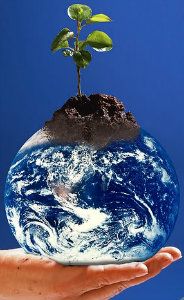Back From the Future

Change oftentimes goes unnoticed when people are not directly involved in the situation, and sometimes not even then. War would be an example of this phenomenon. Many watch the tragic images on their televisions and think "how sad," not understanding the full implications of what it is they are viewing. Maltreatment of the ecosystem, for the sake of equal comparison, is a universal war against the planet.
The unresolved human conundrum; people will kill each other to control aspects of the planet without further consideration to the damage inflicted on the object of their affection, Earth. At the core of the issue, the concern is not whether Earth will die or survive, for she is strong. However, it is wise to consider the frailty of humans. How do people intend to survive when the Earth shakes people off, like ticks burrowed into the fur of an animal?
The universal truth is that every person on the planet is completely dependent on a stable and intricate ecosystem for survival. Without healthy food resources, clean air, and clean water, there is no chance for continued existence. Most people are passive about this reality. More than 137 species goes extinct every day and are permanently removed from the planet's diverse ecosystem. In response, people shrug their shoulders, as though it is an acceptable degree of loss and handle the information with the philosophy that it is simply the cost of doing business. Through scientific determination, it is known that the Earth plays by vastly different rules. The unaccountable human attitude of "someday it will be a problem, but it is not today," is a dangerous misconception.
Researchers are able to construct models of possible futures. In effect, they have created a time machine of probable outcomes. They map out predictable human behaviors and calculate those numbers against real-time environmental data. Here is a look at the projected assessment of life in 2050, by the numbers.
Marine Life:
In 2050, toxic algae blooms are overtaking the global water supply. The result is a collapsing aquatic system. Because of the lack of fish, large marine life goes extinct. Jellyfish seem to thrive in the toxic environment. While they could have been a means of nutrition for humans, the increased levels of toxins in the water render them inedible. Since they are not edible, they proliferate, dominate, and continue to choke out the remaining marine life, rendering the food chain inert. Studies conducted in 2012 found that more than 30 percent of marine life diversity had collapsed. At the time of this awareness, the global community had the means to turn the environmental hazards around in order to preserve oceans and help with the diversified proliferation of marine life to maintain a stable aquatic system.
Animal Life:
At the beginning of the 21st century, politicians believed that the human population would surpass 9 billion people by 2050, which became a topic of priority at the United Nations back in 2005. However, those calculations failed to take the escalation of environmental hazards into consideration.
In 2012, independent genetic research by the National Association for Gene Security and the Institute of Ecological and Evolutional Problems, revealed that regular consumption of genetically modified organisms (GMOs) slowed sexual maturity in animals and gradually made them infertile. In 2050, widespread sterility is first noticed in farm animals, from the consumption of GMOs.
Humans modified the genetic makeup of plants to grow and then self-terminate in order to stop the propagation cycle, for the sake of profit. Since people did not fully understand the consequences of these actions, genetically modified plant genes began to alter the genetic makeup of animals consuming them. Because people consume both tainted plants and animals there is an increase in stillbirths, a decrease in the number of pregnancies, and those born are more likely to suffer from illnesses like autism, which started its unnatural peak in 2006.
Wildlife:
By 2050, one of every 10 wild animal species goes extinct. However, this is considered a conservative estimation and does not factor in the likelihood that humans will more aggressively hunt wildlife for food, as marine life, farm animals, and plants are in short supply and carcinogenic. Animals, not hunted, die off from an increasingly unstable ecosystem. More than 95 percent of the planet's rainforests are stripped and repurposed for human profit, not planetary stability. This compounds water and air pollution issues. Wildlife death tolls are further hastened by the lack of plant and animal diversity necessary to meet dietary needs for their continued survival.
Air:
Air pollution becomes so prolific that many of the bird species and smaller animals suffer premature deaths. Aside from not having clean water to drink or healthy food resources, the mortality of animals and humans continues to compound from trapped greenhouse emissions. This reality was pointed out by the Organization for Economic Co-Operation and Development in 2012, which calculated that increased contact to particulate matter and high ground-level ozone exposure would cause a dramatic rise in infant deaths around the world. Researchers conducted environmental awareness studies in 2008. The results concluded that greater global awareness was urgently needed, as a majority of the world's population does not understand the fundamental complications of greenhouse gasses.
It takes 25 years for greenhouse gasses trapped in the atmosphere to reach the Earth's surface. This means that the pollution emitted in the present affects people 25 years into the future. Because people did not observe dramatic changes in the latter 20th century, scientific findings were paid little heed and even with those calculations coming to fruition in the early 21st century, people continued to turn a blind eye. This leaves those living in 2050 wondering why their ancestors, who professed their adoration and protection, ignored decades of mayday outcries by rational, learned professionals, specifically trained to study the intricacies of the planet's ecosystems. What is the logic behind having the knowledge and failing to use it? What does this say about humans as a species?
The numbers are the numbers. The only way to change the equation is to reconfigure how nations and people utilize resources and minimize the use of those resources that have been proven to be harmful to the environment. The global community making an active choice to put the needs of the planet first accomplishes this goal. There are several key positive outcomes to this line of thinking. In making this goal a priority, it would provide employment opportunities to a majority of the global population. Imagine, people help the planet recuperate and achieve stable employment for the foreseeable future – now there is a win/win situation.
The unresolved human conundrum; people will kill each other to control aspects of the planet without further consideration to the damage inflicted on the object of their affection, Earth. At the core of the issue, the concern is not whether Earth will die or survive, for she is strong. However, it is wise to consider the frailty of humans. How do people intend to survive when the Earth shakes people off, like ticks burrowed into the fur of an animal?
The universal truth is that every person on the planet is completely dependent on a stable and intricate ecosystem for survival. Without healthy food resources, clean air, and clean water, there is no chance for continued existence. Most people are passive about this reality. More than 137 species goes extinct every day and are permanently removed from the planet's diverse ecosystem. In response, people shrug their shoulders, as though it is an acceptable degree of loss and handle the information with the philosophy that it is simply the cost of doing business. Through scientific determination, it is known that the Earth plays by vastly different rules. The unaccountable human attitude of "someday it will be a problem, but it is not today," is a dangerous misconception.
Researchers are able to construct models of possible futures. In effect, they have created a time machine of probable outcomes. They map out predictable human behaviors and calculate those numbers against real-time environmental data. Here is a look at the projected assessment of life in 2050, by the numbers.
Marine Life:
In 2050, toxic algae blooms are overtaking the global water supply. The result is a collapsing aquatic system. Because of the lack of fish, large marine life goes extinct. Jellyfish seem to thrive in the toxic environment. While they could have been a means of nutrition for humans, the increased levels of toxins in the water render them inedible. Since they are not edible, they proliferate, dominate, and continue to choke out the remaining marine life, rendering the food chain inert. Studies conducted in 2012 found that more than 30 percent of marine life diversity had collapsed. At the time of this awareness, the global community had the means to turn the environmental hazards around in order to preserve oceans and help with the diversified proliferation of marine life to maintain a stable aquatic system.
Animal Life:
At the beginning of the 21st century, politicians believed that the human population would surpass 9 billion people by 2050, which became a topic of priority at the United Nations back in 2005. However, those calculations failed to take the escalation of environmental hazards into consideration.
In 2012, independent genetic research by the National Association for Gene Security and the Institute of Ecological and Evolutional Problems, revealed that regular consumption of genetically modified organisms (GMOs) slowed sexual maturity in animals and gradually made them infertile. In 2050, widespread sterility is first noticed in farm animals, from the consumption of GMOs.
Humans modified the genetic makeup of plants to grow and then self-terminate in order to stop the propagation cycle, for the sake of profit. Since people did not fully understand the consequences of these actions, genetically modified plant genes began to alter the genetic makeup of animals consuming them. Because people consume both tainted plants and animals there is an increase in stillbirths, a decrease in the number of pregnancies, and those born are more likely to suffer from illnesses like autism, which started its unnatural peak in 2006.
Wildlife:
By 2050, one of every 10 wild animal species goes extinct. However, this is considered a conservative estimation and does not factor in the likelihood that humans will more aggressively hunt wildlife for food, as marine life, farm animals, and plants are in short supply and carcinogenic. Animals, not hunted, die off from an increasingly unstable ecosystem. More than 95 percent of the planet's rainforests are stripped and repurposed for human profit, not planetary stability. This compounds water and air pollution issues. Wildlife death tolls are further hastened by the lack of plant and animal diversity necessary to meet dietary needs for their continued survival.
Air:
Air pollution becomes so prolific that many of the bird species and smaller animals suffer premature deaths. Aside from not having clean water to drink or healthy food resources, the mortality of animals and humans continues to compound from trapped greenhouse emissions. This reality was pointed out by the Organization for Economic Co-Operation and Development in 2012, which calculated that increased contact to particulate matter and high ground-level ozone exposure would cause a dramatic rise in infant deaths around the world. Researchers conducted environmental awareness studies in 2008. The results concluded that greater global awareness was urgently needed, as a majority of the world's population does not understand the fundamental complications of greenhouse gasses.
It takes 25 years for greenhouse gasses trapped in the atmosphere to reach the Earth's surface. This means that the pollution emitted in the present affects people 25 years into the future. Because people did not observe dramatic changes in the latter 20th century, scientific findings were paid little heed and even with those calculations coming to fruition in the early 21st century, people continued to turn a blind eye. This leaves those living in 2050 wondering why their ancestors, who professed their adoration and protection, ignored decades of mayday outcries by rational, learned professionals, specifically trained to study the intricacies of the planet's ecosystems. What is the logic behind having the knowledge and failing to use it? What does this say about humans as a species?
The numbers are the numbers. The only way to change the equation is to reconfigure how nations and people utilize resources and minimize the use of those resources that have been proven to be harmful to the environment. The global community making an active choice to put the needs of the planet first accomplishes this goal. There are several key positive outcomes to this line of thinking. In making this goal a priority, it would provide employment opportunities to a majority of the global population. Imagine, people help the planet recuperate and achieve stable employment for the foreseeable future – now there is a win/win situation.
You Should Also Read:
Clean Water for Healthy Animals
Fossil Fuels Affect Core Aquatic Life
Animal Welfare, Human Health, and Chemical Abuse

Related Articles
Editor's Picks Articles
Top Ten Articles
Previous Features
Site Map
Follow @WildlifeWelfare
Tweet
Content copyright © 2023 by Deb Duxbury. All rights reserved.
This content was written by Deb Duxbury. If you wish to use this content in any manner, you need written permission. Contact Deb Duxbury for details.







